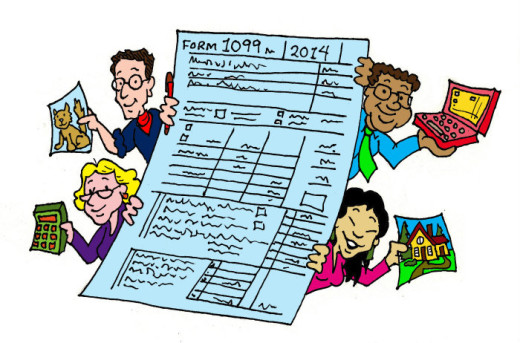See the previous section of The Local Economy Revolution, Pedestrian Scale Environments.
For many of our communities’ most valuable workers, the very nature of being employed looks nothing like we traditionally think it does.
We have a big sleeper challenge when it comes to building small business ecosystems: for many of our communities’ most valuable workers, the very nature of being employed looks nothing like we traditionally think it does. And that means that many of our well-intentioned efforts to support the growth of creative and innovation-based industries miss key opportunities to foster those sectors’ growth.
In the U.S., we call many of these folks 1099ers, or freelancers or contract workers.
1099ers typically have professional, technical and/or creative skills that they use to provide services to a client under a contract. They might have one client or several dozen. They might spend their days on a computer, in a meeting, or in a workshop, and they might work in splendid isolation or as part of a team.
What they do share is their employment status: they aren’t on someone else’s payroll as a “regular” worker. This is where the term comes from: since no one withholds taxes from a salary for them, these workers’ earnings are reported on IRS Form 1099, which is completed by the client and submitted by the 1099er as part of their tax returns. Like a W-2 for a regular employee, your stack of 1099s are how you document your income to the feds.
A recent issue of the International Economic Development Council’s ED Now Journal asserted that as much as one fifth of the U.S. workforce may qualify as a 1099er.
Why is that so vague?
Simple: conventional economic data sources, like the Census, don’t count them. The way the analysis is set up, we simply cannot see them.
I am on my second gig as a 1099er (I had a different consulting business in the 1990s). My brother, the lady I had lunch with today and eight of the last 10 people I connected with on LinkedIn are 1099ers. So is my neighbor the illustrator, my neighbor the accountant, my friend’s husband the IT professional, my colleague’s husband the architectural designer, and… you get the idea. If you aren’t looking for them, you don’t see ‘em. But we are everywhere — young, old, suburban, urban, stereotypically “creative” and boringly technical.
Welcome to the new small business ecosystem.
So what, some of you say. Freelancers are nothing new.
if more and more of our employment, and particularly our creative and technical employment (read: Talent), is working as 1099ers, what does that imply for local economic development?
True, but here’s the challenge: if more and more of our employment, and particularly our creative and technical employment (read: Talent), is working as 1099ers, what does that imply for local economic development, for those small business ecosystems that we need to foster?
There’s been a lot written on this topic in terms of state and federal impacts on issues like health care. But no one’s talking much yet about how this trend impacts local communities. Obviously, state and federal policies on issues like health care and taxes will have a big impact in the long term, but I think there’s several key factors that we need to have on our radar when doing economic development in our local communities:
All of that is a whole lot easier said than done … and if the 1099ers in your local economy are spin-offs from a corporate setting, or young adults trying to get established, you’re depending on them to make the right decisions on complicated issues that can easily determine whether they succeed or fail (not to mention whether they contribute to your local economy). If 1099ers make up an important part of your local economic strategy, how smart is it to leave their choices entirely to chance?
1099ers work anywhere, and often many anywheres. And good anywheres are hard to find.
As I mentioned, I have been a 1099er for the majority of the last 20 years. A lot of times it seems like change is the only constant. Some weeks I work from home, some weeks I work from a workshare space or a back room in a client’s office. Some weeks I seem to do my best work in a coffee shop, and some days I have to have silence. Some weeks I end up on an 8 to 6 work schedule, and some weeks (like the last week before the kids go back to school…ahem) it’s catch as catch can.
All this has to do with that Third Places issue that some economic development people have picked up on from planners, but it also means much more.
Your 1099ers probably can’t work in a coffee shop all the time — flexible arrangements for small office space can be unbelievably valuable, which is why coworking spaces have proliferated in many cities.
But one of the biggest spatial gaps that impacts 1099ers is meeting space.
Some 1099ers can do everything online, but if you need to meet in person and put your heads together on a project, even a nice coffee shop can be too much distraction and confusion for serious creative or problem-solving work.
I have taken to having meetings for one group I am working with in my dining room because I know that I can control the noise and distraction level. But that would be too informal to meet someone for the first time, and it doesn’t always accommodate the group’s work tasks too well. Plus, the oh-crap-we-need-to-clean-the- school-projects-off-the-table-and-hide-the-junk-before-they-get-here rush isn’t the most pleasant way to set up for a meeting. Plus, I actually have a dining room table, and a dining room, and not everyone has a dining room table or room anymore.
Inexpensive professional meeting space is the unicorn of the 1099er — and something most communities could provide relatively easily.
Inexpensive professional meeting space is the unicorn of the 1099er — and something most communities could provide relatively easily.
Safety net? What safety net? Unless they are lucky enough to have picked the right spouse of the right gender or in the right state, chances are many of your 1099ers don’t have much of one.
This touches on those national debate issues of healthcare and insurance, but this is why you should care: the repercussions of those policies or lack of policies will be felt in your town, on your bottom line, far before they hit Congress. If 1099ers are a big part of your local economy, how much do you really want to sit around and wait until that highly functional national body figures it out?
That doesn’t mean that you have to get into the insurance business. It does mean that it might be in the community’s best interest to put some emphasis on identifying and promoting resources that might help 1099ers bridge that gap.
- Does a local or regional chamber offer small business insurance?
- Does your state permit collective insurance groups to organize?
- Could a barter system help some of your 1099ers bridge the occasional tough gap?
- Who can figure out or organize this stuff if you can’t?
That last point comes back to perhaps the most important point in the transition from conventional economic development approaches to an emphasis on building a small business ecosystem:
No one, even your government or agency, can do it alone. Our role has to shift from doer to mobilizer, from implementer to organizer — from project manager to team leader.
I use education analogies a lot, partly because that’s a key element of my background, and partly because everyone’s been a student.
When I talk about shifting our roles, what I am talking about is akin to what you learn when you become a teacher.
 As a teacher, I could not make my students learn. I could not put the stuff they needed to know inside their heads. What I could do, and what I had to do if they were going to learn anything, was create the environment and give them access to the tools that they needed to learn (and yes, sometimes the promise of unpleasant consequences comes in pretty handy).
As a teacher, I could not make my students learn. I could not put the stuff they needed to know inside their heads. What I could do, and what I had to do if they were going to learn anything, was create the environment and give them access to the tools that they needed to learn (and yes, sometimes the promise of unpleasant consequences comes in pretty handy).
As a result, the learning that the students get is never perfect, not as perfect as it would be if I could just dump the facts inside their heads. But it’s the only result that is realistically achievable.
Our small business ecosystems in general, and our 1099ers in particular, probably need us to learn more closely from good teachers.
Coming next: Use Incentives Right
